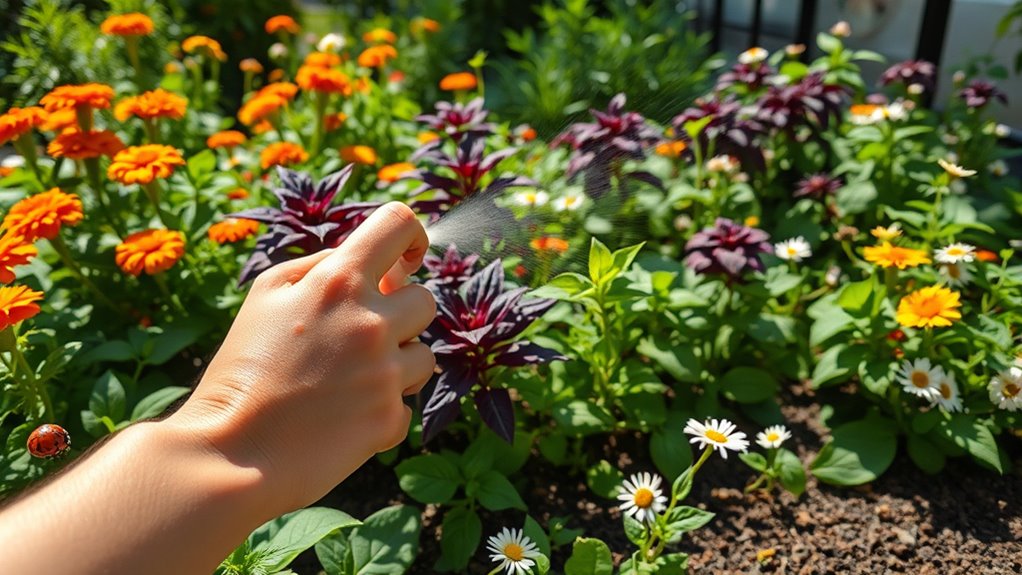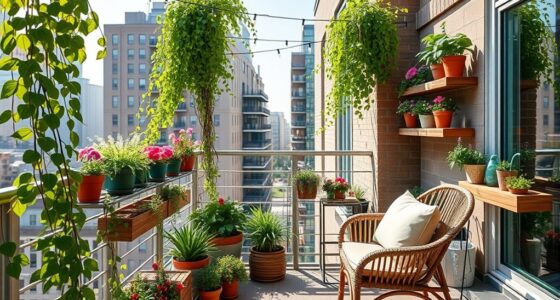To keep pests at bay in your city garden naturally, try companion planting with marigolds, basil, or garlic to repel common bugs. Encourage beneficial insects like ladybugs and lacewings by planting nectar-rich flowers and creating habitat zones. Regularly monitor your plants’ health and adjust your strategies as needed. By promoting diversity and ecological balance, you can protect your garden safely without harmful chemicals—keep going to discover more effective natural pest solutions.
Key Takeaways
- Use companion plants like marigolds, basil, garlic, and chives to naturally repel common garden pests.
- Attract beneficial insects such as ladybugs and lacewings by planting nectar-rich flowers to control pest populations.
- Create habitat zones, like straw piles or flower borders, to encourage natural predators and enhance ecosystem balance.
- Regularly monitor pest activity and beneficial insect presence to adjust planting strategies effectively.
- Minimize chemical use by practicing organic pest management techniques that promote plant health and environmental safety.

Living in a city doesn’t mean you have to rely on harsh chemicals to protect your garden from pests. Instead, you can embrace natural pest management techniques that are both effective and eco-friendly. One of the most practical approaches is companion planting, which involves growing certain plants together to repel pests or attract beneficial insects. For example, planting marigolds near vegetables can deter nematodes, while basil nearby can ward off aphids. By thoughtfully choosing your plant combinations, you create a natural barrier that confuses pests and reduces their numbers without risking the health of your garden or the environment.
Alongside companion planting, biological control offers another powerful, chemical-free method to keep pests in check. Biological control involves introducing or encouraging natural predators such as ladybugs, lacewings, or parasitic wasps that prey on common city garden pests. You can attract these beneficial insects by planting nectar-rich flowers or providing shelter, making your garden an inviting habitat for them. This approach not only reduces pest populations but also maintains a balanced ecosystem, preventing any one pest from becoming overwhelming. Biological control is especially suited for city gardens, where space is limited, and chemical use can pose risks to both humans and pollinators.
Implementing these methods requires some planning, but it’s well worth the effort. Start by observing which pests frequently visit your garden and then choose companion plants known to repel those specific pests. For instance, garlic and chives are excellent at deterring aphids and beetles. Simultaneously, create habitat zones that support beneficial insects. A small pile of straw or a flower border can serve as a refuge for predatory insects, ensuring they stick around to naturally control pests over time. Remember, maintaining diversity in your garden encourages a resilient ecosystem where pests are naturally kept in check by their predators.
Frequently Asked Questions
Are Natural Pest Solutions Safe for Children and Pets?
You’re wondering if natural pest solutions are safe for children and pets. Generally, these options prioritize child safety and pet protection, making them a better choice than chemical alternatives. You should always read labels carefully and follow application instructions to minimize risks. When used properly, natural pest solutions can effectively protect your garden while ensuring your loved ones stay safe. Always choose products specifically labeled as safe for children and pets.
How Often Should Natural Pest Treatments Be Applied?
You should apply organic sprays and conduct pest monitoring regularly to keep pests at bay. Typically, reapply every 7 to 14 days, but adjust based on pest activity and weather conditions. Consistent monitoring helps you catch infestations early, reducing the need for frequent treatments. Always follow the product instructions and observe your plants for signs of pests or over-application, ensuring your garden remains healthy and safe for children and pets.
Can Natural Methods Eliminate All Types of City Garden Pests?
Natural methods can markedly reduce many city garden pests, but they might not eliminate all types completely. You should use companion planting to deter pests and attract beneficial insects, while biological controls like predatory insects help keep pest populations in check. Consistent application and integrated strategies improve your chances, but some stubborn pests may require additional measures. Stay vigilant and adapt your approach to protect your garden naturally.
Do Natural Pest Solutions Affect Beneficial Insects?
You might wonder if natural pest solutions impact beneficial insects. Generally, these methods target specific pests, helping with pest suppression without harming beneficial insects like bees and ladybugs. However, some broad-spectrum options could unintentionally affect helpful insects. To protect beneficial insects, choose targeted solutions and apply them carefully. By doing so, you support a healthy balance in your city garden while effectively controlling pests.
Are Natural Pest Controls Cost-Effective Compared to Chemical Options?
Think of natural pest controls like planting a garden of savings—you’ll harvest long-term benefits. When you compare costs, natural methods often have a lower initial investment and fewer ongoing expenses. Over time, they offer significant long-term savings by reducing reliance on costly chemicals and preventing damage. So, yes, natural pest controls are typically more cost-effective than chemical options, making your city garden healthier and your budget happier.
Conclusion
So, next time pests invade your city oasis, ditch the toxic sprays and embrace these natural heroes. After all, who needs chemical chaos when a little neem oil or ladybugs can do the job? Remember, you’re not just protecting your plants—you’re championing a greener, happier planet. Plus, if bugs start whining about unfair treatment, just remind them they’re lucky to be part of your eco-friendly pest control revolution. Happy gardening!









